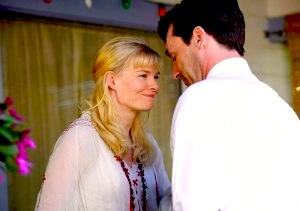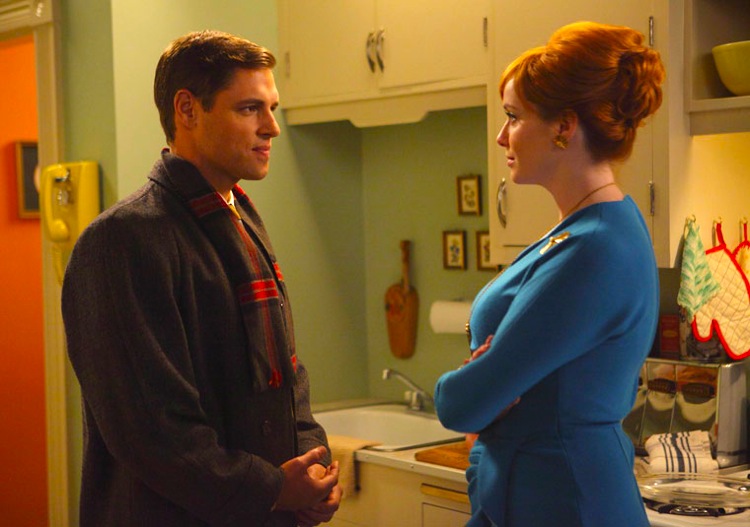By Jennifer Baldwin. One of the things I love about Mad Men is the tone of the show. It’s dispassionate, restrained, observant. In its first season, the show had a tendency to get a little condescending towards the era, but thankfully, show runner Matthew Weiner has managed to pull back on this tendency and just let the era “be” — he doesn’t flinch from showing the faults of these characters and their society, but he also doesn’t preach at us about how horrible these people and their world were. He just lets the world of the show play out, and it’s up to us how we judge things. Compared to other shows and movies set in the 1960s, Mad Men is one of the least preachy.
The increasingly detached, observant tone of Mad Men is what helps make it so fascinating, both as drama and as social commentary. This third episode of Season Four is no exception. The characters and their choices are given to us with very little commentary or editorializing from the writers and it’s up to us, the audience, to decide how we feel about them.

At its most basic, Mad Men is a character study. People who’ve tried just watching one episode here or there find they can’t get into the show, but that’s because it’s hard to jump in midstream when you’re watching the lives of fully developed people unfold before your eyes. It takes time to get to know someone, and the characters of Mad Men — the life blood of the show — are as multi-faceted and complex as fictional characters get. It takes time to get to know them.
This week’s episode, in fact, made me feel something I never thought I’d feel for a character I never thought I would like: Greg, Joan’s husband (a character I had previously nicknamed “Doctor McRapist Jerkface”). But somehow, just as they did with Pete over the course of the first couple of seasons, the Mad Men writers have made Dr. Greg sympathetic. When he bandages Joan’s finger after she cuts herself in the kitchen — the way he calms her down, comforts her, takes charge — it was endearing. Suddenly, a character that I couldn’t wait to leave for Vietnam so he could get killed was a character I kinda, sorta, unbelievably cared about. It was a moment that made me realize that Joan married him not just for the stability and because he was a good-looking doctor, but because he has a heart, that she saw something good in him, even though he had committed a despicable act against her (the rape scene from Season Two). It’s the kind of character moment that Mad Men excels at: a seemingly “bad” character doing a good thing.

Of course, that’s the whole appeal of a character like Don Draper; a character we’re fascinated by and care about, even as he does some pretty bad things. This week’s episode gave us the two sides of Don: the caring, sensitive, wounded Dick Whitman and the swinging, boozy, divorcee businessman Don Draper. When he visits Anna Draper in California and finds out she has terminal cancer (and that she hasn’t been told about it), we witness his heart breaking before our eyes.
But then Don returns to New York, takes recently-left-by-his-wife Lane Pryce under his wing, and the two go out for a night of drinking, excess, and eventually, prostitutes. Don echoes the line from last week — about the conflict between doing what we want versus doing what’s expected of us — and he encourages Lane to do what he wants and not what’s expected of him. Lane sleeps with the prostitute that Don has gotten for him; he’s chosen self over duty. Lane won’t be jetting off to England any time soon to try to repair his marriage.
And so, another thread in the fabric of a stable society is thereby cut. “Don Draper” seems to be winning out over “Dick Whitman” this season. And he’s bringing characters like Lane Pryce with him. It remains to be seen whether these two will find any lasting happiness on the path they have chosen. Welcome to 1965.
One final thought: Don and Lane really should have gone to see The Umbrellas of Cherbourg, one of my favorite films, instead of Godzilla vs. The Thing (or Gamera, or whatever Japanese monster movie that was). At least they didn’t go see It’s a Mad, Mad, Mad, Mad World.
Posted on August 11th, 2010 at 12:20pm.

There is so little entertainment today that has a brain or any complexity. The Joker’s post says that Hollywood films like “Dinner for Schmucks” are afflicted by the need to be likeable, yet “Mad Men” seems to buck that trend with its darker characters.
Jennifer, what do you think “Mad Men’s chances are at the Emmy’s this year? Word is that it’s getting some real competition from “The Good Wife.”
That’s a very good question, Shelby. I have heard of “The Good Wife,” though I’ve not seen it.
But Emmy voters are notoriously resistant to change; they tend to stick with a show for several years (sometimes even after that show has dipped in quality), before switching to a new favorite. Will this be the year “Mad Men” falls out of Emmy favor? It will be interesting to see. Season 3 of “Mad Men” was not my favorite, although the finale was one of the best episodes of television I’ve seen in a long time. “Breaking Bad” seems to be getting a lot of buzz too.
And then there’s the final season of “LOST.” That might get some “it’s the final season of an iconic show” votes. Things are pretty wide open this year for best drama.
If “True Blood” wins, though, I might have to kill myself. 😉
I am drawn to “Mad Men” on so many levels. On one hand, I am a baby boomer who wants to wallow in nostalgia for my youth…but I like how the series seems to stand back and watch things happen and make rather make subtle points just by showing viewers 60’s behavior and ideas through the lens of today. Most of all, the series is entertaining and intelligent, which is a revelation for anything on TV which seems to have devolved into the “Jersey Shore.” Hey fuggeddaboutit!
Anton, I still can’t believe how famous these Jersey Shore people are.
TV really has split into two extreme sides: the trashy, exploitative reality shows and formulaic scripted television on one side, and the original and intelligently written dramas and comedies (airing mostly on cable) on the other side. It’s feast and famine. Luckily, Mad Men is part of the feast.
Of course, I can’t have nostalgia for the 60s since I wasn’t alive then, but I do love Mad Men for the glimpse it gives me of my parents’ and grandparents’ era. My grandparents are almost exactly the same age as Betty and Don and it’s just wild to think about them as being that young.
This was the last era in which men were men, and not adolescents. This doesn’t mean that they had to behave like pigs like Dr. Greg, but that they followed the lead of classic stars from the late ’50s – early ’60s like John Wayne, Kirk Douglas, and William Holden who were men’s men but treated ladies with respect.
You’re very right, Prehistoric Woman. Greg isn’t much of a man. We saw it in the rape, we see it in his infantile displays and selfishness with Joan. He’s a grown up child, not an adult.
But darn it, if the writers didn’t make me feel bad for him in this episode. He’s such an immature child that he can’t even see the problems in his marriage with Joan, and yet in the scene where he bandages the finger, his weakness and immaturity turn pathetic and strangely endearing. Leave it to Mad Men, always with the complex, painfully human characters!
I’ll still call him Dr. McRapist Jerkface, though. 😀